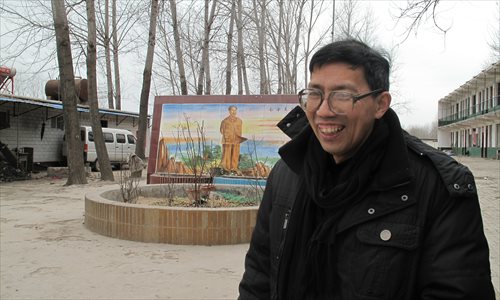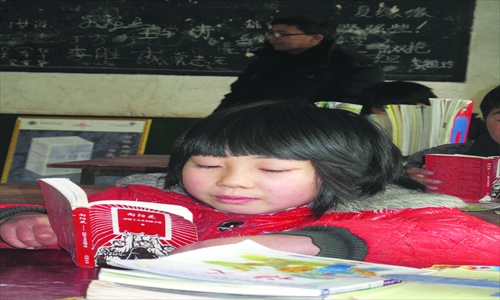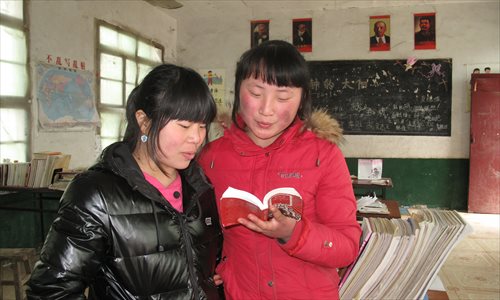Mao’s final teacher

Xia Zuhai, 49, a passionate promoter of Mao Zedong Thought, has spent the past 19 years promoting "red education" among students in his self-run primary and secondary school, despite a constant barrage of criticism on his controversial teaching methods.
Xia launched Minzhu Elementary and Secondary School in the suburbs of Huaiyang county, Henan Province in 1996. He built the school while harboring the ambition of "shaping students' good moral character" through Mao Zedong Thought. Differing from other teachers, Xia is less concerned about students' academic performance. Instead, he places a high value on students' capability to practice the core values of Mao Zedong Thought.
"The most important thing is to shape students' good moral character by conducting Mao Zedong Thought. My goal is to train my students into people who can 'serve the people' - this is the core idea of Mao Zedong Thought," Xia argued.
Time passed, and Xia found himself under a mountain of debt and alienated from his relatives and friends, due to his obsessive quest devotion to the red education.
In the meantime, his school has faced a dilemma in recent years as it has become difficult to enroll students due to the increasing number of competitive private-run schools in Huaiyang.
Red curriculum
Just outside the school, a three-meter long portrait of Mao Zedong waves at passers-by while inside the school atrium, a statue of the Chairman dominates the room.
Mao Zedong-inspired elements are seen everywhere such as portraits and quotations hanging on the wall of each classroom.
The school has adopted a paramilitary style of management, explained by Xia as necessary for his students to build up a "strong will" by enduring hardships. Students are woken up to the music of The East is Red at 5:30 am every day. After washing their faces and brushing their teeth, they run around the playground 10 times, come rain or shine.
Students are then asked to read and recite the Quotations From Chairman Mao Zedong also known as The Little Red Book, at the beginning of each class.
Lin Kunling, a 7-year-old girl, already can read fluently some articles from The Little Red Book, and she can sing almost every revolutionary song in the music book. However, few students could explain the meaning of "Serve the People" when asked by the Global Times.
Memorial events are held each year on the anniversary of Chairman Mao's birthday and death. Diversified activities are held to commemorate Mao with students asked to bow and make vows in front of his statue. They also stage performances to pay tribute to Chairman Mao and the revolutionary martyrs.
"By holding different kinds of activities, students would keep in mind the difficulties our revolutionary martyrs had when they founded the nation. They would be inspired by their spirit and face life positively when they encounter difficulties," Xia said firmly.
Except for normal classes, such as Chinese, maths and English, students are also asked to attend at least two red education lessons a week. During the classes, students watch red movies, sing red songs, hold discussions about red artworks and write movie reviews.
Lin Jia, a 16-year-old girl recalled one of the most impressive red education lessons she had received. "Headmaster Xia taught us the importance of filial piety in one class, and asked us to wash our parents' feet as homework. I did so. My parents were greatly moved and we held each other tightly," said Lin, explaining this helped her mend a difficult relationship with her parents.
Mao lit a light
Born in a poor family, Xia originally planned to change his life by relying on the gaokao, the national college entrance examinations. However, he was diagnosed with ankylosing spondylitis, a spinal disease, and was unable to sit the gaokao due to his worsening physical condition in the early 1980s.
While recuperating in bed, he realized he got sick "due to the high-pressure caused by the gaokao," and decided he should do something to challenge the exam-oriented system.
During that time, Xia survived the most difficult time of his life by reading and reciting the classic works of Chairman Mao and other red classics.
"The red classics lit a light for me, and I was greatly inspired by the positive values of Mao Zedong Thought, so I believe it could also help others," Xia said.
Red education was at its apogee in the 1980-90s when most schools and universities focused on patriotic education for their students.
After working as a teacher in a local public school for seven years, Xia decided he should launch his own school.
This proved to be an arduous task indeed. Xia borrowed tens of thousands of yuan from his relatives to build a two-story house. Over the next five years, his family had to live frugally to pay the debts.
"It was a luxury for us to eat pork during that time. We usually ate pork once a year during the Spring Festival. During the worst time, we had to borrow salt from our neighbors before we cooked dishes," Wang Hui, Xia's wife, told the Global Times.
Wearing a Chinese style cotton-padded jacket and bottled-thick glasses, Xia looks like he walked out from the 1980s. He doesn't use a computer and spends almost his time at the school. He lives there with his wife, in one converted classroom, packed with books and newspapers.

No more students
Xia had not expected that 19 years after its foundation, his school would be going downhill. The number of students has simply plummeted from more than 500 in 2006 to fewer than 20 today.
A new semester began in late February but even fewer students showed up for class. Some parents from Shandong Province removed their children from Xia's school this year, claiming they were worried about their kids' academic performances.
There are in total 17 students and seven teachers at school this year. Most of the students are from under-privileged families, and some of them suffer from various mental illnesses.
"We used to have more than 500 students before 2006 when people held a comparatively objective attitude towards Mao Zedong Thought. However, nowadays, more and more people are skeptical about Mao's ideology, and they all think about making good money rather than serving the people," Xia said.

In the meantime, an increasing number of private-run schools with good basic infrastructure and trained teachers has sprung up and attracted a lot of students. At least 12 private-run schools have opened in the last two years within driving distance of Xia's establishment.
"Red education is out of date, and we just want our children to get high scores, enter universities and get a good job. Who would ever think about whether he would serve the people in the future or not?" 33-year-old Wang Li told the Global Times.
Instead of sending her son to Xia's school which is only five minutes' walk away, Wang sends her 8-year-old son to a village school 10 minutes away by car.
Xia's peers also disagree with his teaching methods. "There is no fault in seeking to pass on the red spirit, however, we should also improve students' academic performance and encourage them toward all-round development," Wu Zhisheng, headmaster of a local public middle school and an old acquaintance of Xia, told the Global Times.
Xia's school also lacks qualified teachers and basic infrastructure, Wu pointed out.
No way out
A lot of people, including his wife, asked Xia to give up on promoting Mao Zedong Thought and to transform the school into an ordinary private school, but Xia has so far refused to listen. "I won't transfer the school to anyone or close it even if there are no students. I have to defend the last battlefield for Chairman Mao," Xia responded.
On May 2, a young couple from Jiangxi Province sent their 6-year-old adoptive girl, who is mentally disabled, to Xia's school, hoping that Xia could take her in.
"A lot of schools refused to take in my child or they charged expensive tuition fees that we cannot afford. As my parents are getting older and we have to work in big cities, I have to find some place for her," the girl's father told the Global Times.
At last, Xia took in the girl, saying "this might be the future of our school. We might take in children all across the country who are not accepted by ordinary schools, like the disabled and the sick," Xia said.
Even though the school faces financial difficulties, Xia provides free education for some students who come from less-privileged families. Xia Manman, whose parents are both disabled, has been studying at the school for free for three years.
Despite the downfall of the school, most students interviewed by the Global Times said they appreciated what they had learned from Xia.
"I was greatly impressed that headmaster Xia always got up earlier than us and went to bed after we went to sleep. He practiced the meaning of being a good man through his actions," 21-year-old Zhang Li, a freshman in Xinjiang University of Finance and Economics and a graduate from Minzhu school, told the Global Times.
"Most of the students may not make huge achievements in their careers, but almost all of us grew up to become upright people and hold a positive attitude toward life," Zhang Haitao, a salesman at a pesticide company in Jiangxi and another graduate, told the Global Times.